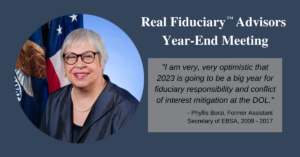The Institute was joined by Ron Rhoades, Phyllis Borzi, Eileen Stevens, and James Tierney for a discussion of “fiduciary” in both 2022 and 2023.
Investor Advocates Urge DOL To ‘Fix’ Retirement Plan Advisor Rule
Investor advocates, including the CFA, PIABA, and Ron Rhoades, sent a comment letter in opposition of the DOL’s advice rule.
Sanderson Wealth Management
Sanderson Wealth Management 50 Fountain Plaza, Suite 750 Buffalo, NY 140202 Justin Sanderson, VP and Chief Compliance Officer (716) 566-2522 justin@sandersonllc.com www.SandersonLLC.com Services Comprised of a full suite of services including investment consulting, financial management consulting, business succession planning, estate and generational wealth planning, tax consulting, and philanthropic consulting, our Private Wealth Advisers offer a […]
Massachusetts is considering its own investor protection rule. Brokerage and insurance groups oppose it
Massachusetts is looking to enforce an industry-wide fiduciary standard within its own borders. Will other states follow?
SEC Investor Roundtables Reveal Investors Often Do Not Understand Form CRS
The SEC’s own Investor Roundtables clearly demonstrate that not even well-educated professionals can understand Form CRS.
Financial Firms’ Step Toward Fiduciary; Are These Steps Enough and Will They Stay Intact?
In 2016 and 2017, the Consumer Federation of America reported in three separate comment letters that 34 financial firms changed their products and/or product offerings to comply with the DOL Fiduciary Rule. They did so against a backdrop of industry criticism that the Rule would be harmful not only to their own business models, but to their customers and clients as well. Some of the very same firms heftily contributed to that backdrop. However, in announcing their new products and offerings, many of these same firms reversed their position on the impact on investors. Now, they believe such changes are overdue, prudent, and beneficial to customers. Why the switch? And will such product improvements survive the recent vacatur of the DOL Rule? Time will tell.






